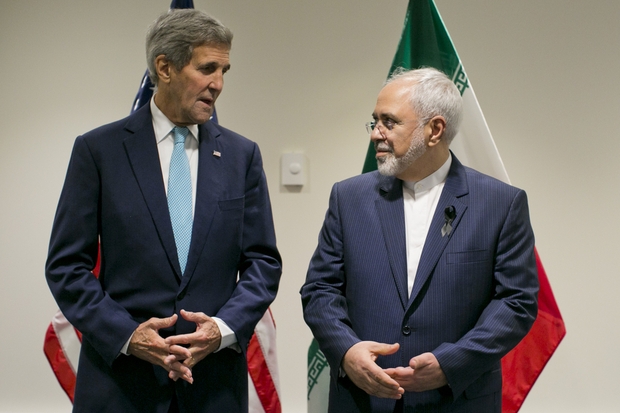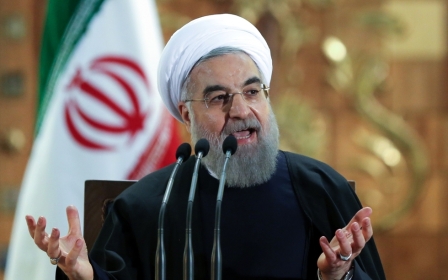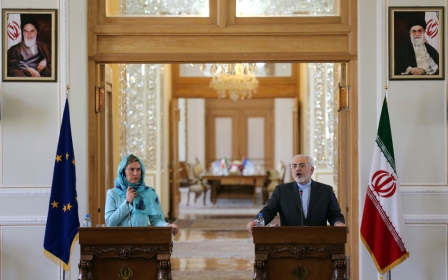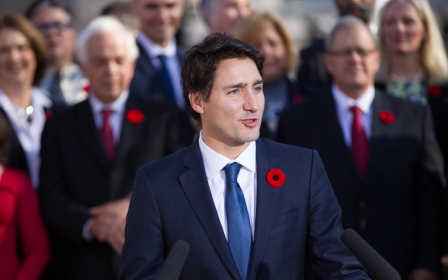Kerry and Zarif to meet again on Iranian sanctions relief

US Secretary of State John Kerry will meet in New York on Friday with Iran's Foreign Minister Mohammad Javad Zarif, as Tehran complains that Washington has not lived up to its nuclear deal obligations.
Kerry's spokesman, John Kirby, told reporters in Washington that the two top diplomatic chiefs plan to hold another day of talks following a meeting at the UN on Tuesday.
Tehran has said it is not receiving enough sanctions relief.
"In these discussions with Foreign Minister Zarif tomorrow, I fully expect that they will continue to talk about the sanctions relief process, and the degree to which banks, foreign and domestic, as well as institutions foreign and domestic are evaluating their options under the JCPOA," Kirby said on Thursday, referring to the Joint Comprehensive Plan of Action as the international nuclear deal is also known.
Kerry and Zarif will address "the degree to which they have before them a sufficient level of understanding to make decisions with respect to sanctions relief," Kirby said at the State Department's daily briefing.
This week's meetings mark the first face-to-face encounters between Kerry and Zarif since January, when they met in Vienna to formally implement the nuclear deal.
On Monday, Kerry said that Iran has so far seen only around $3 billion in previously frozen assets returned since it struck a nuclear deal with world powers.
"Sometimes you hear some of the presidential candidates putting out a mistaken figure of $155 billion. I never thought it would be that.
"Others thought it would be about $100 billion, because there was supposedly about $100 billion that was frozen and so forth," he continued.
"We calculated it to be about $55 billion, when you really take a hard look at the economy and what is happening," he said, giving the usual State Department estimate.
"Guess what folks. You know how much they have received to date? As I stand here tonight, about $3 billion."
Iranian officials have complained that the United States has not lived up to its side of the nuclear agreement because Western banks and corporations have been reluctant to renew business ties.
The country's central bank governor said on 15 April that the international community is not sticking to its promises to lift sanctions on Iran in the wake of the nuclear deal.
Valiollah Seif said the US-led world powers involved in the negotiations leading up to the agreement continue to set obstacles to its economic revival.
"The impact that we were expecting to get is not what we see, at least on a tangible basis," he told a forum at the Council of Foreign Relations in Washington.
"We still don't have normal conditions, we're still in abnormal conditions."
Tehran and the major powers led by the United States agreed in July 2015 to lift sanctions that had locked down much of the Iranian economy for years in exchange for limits on Tehran's nuclear programme.
The move allowed the country to resume a high level of oil exports and opened up more trade opportunities. But with the US still maintaining some sanctions on the country, its access to the global financial system remains limited.
Seif, in the US capital for the IMF-World Bank spring meetings, pointed to the reticence of European banks to engage with the country in fear of falling afoul of US sanctions.
"They have been asked not to work with Iranian banks, and they're afraid," he said.
"It's because of the heavy penalties that have been imposed upon them."
Kirby refuted those claims on Thursday.
"We certainly are not trying to become an obstacle in any way of foreign banks and institutions working with Iran through the sanctions relief process and doing legitimate business with Iran," he said.
He added: "We believe we are working hard to try to explain what the obligations are, what the responsibilities are and what the opportunities are for foreign institutions and banks under the JCPOA."
Washington, for its part, has also pointed the finger at Tehran, warning that it retains the right to impose new sanctions over Iran's ballistic missile tests.
New MEE newsletter: Jerusalem Dispatch
Sign up to get the latest insights and analysis on Israel-Palestine, alongside Turkey Unpacked and other MEE newsletters
Middle East Eye delivers independent and unrivalled coverage and analysis of the Middle East, North Africa and beyond. To learn more about republishing this content and the associated fees, please fill out this form. More about MEE can be found here.




